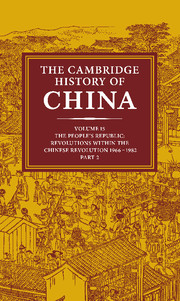Book contents
- Frontmatter
- 1 Mao Tse-tung's thought from 1949 to 1976
- PART I THE CULTURAL REVOLUTION: CHINA IN TURMOIL, 1966–1969
- PART II THE CULTURAL REVOLUTION: THE STRUGGLE FOR THE SUCCESSION, 1969–1982
- PART III THE CULTURAL REVOLUTION AND ITS AFTERMATH
- 6 China's economic policy and performance
- 7 Education
- 8 Creativity and politics
- PART IV LIFE AND LETTERS UNDER COMMUNISM
- PART V THE SEPARATED PROVINCE
- Epilogue: the onus of unity
- Appendixes: meetings and leaders
- Bibliographical essays
- Bibliography
- Index
- Map 1: China’s physical features
- Map 2. PRC: political (Wade–Giles romanization)
- Map 3. PRC: political (pinyin romanization)
- Map 7: Population
- References
8 - Creativity and politics
from PART III - THE CULTURAL REVOLUTION AND ITS AFTERMATH
Published online by Cambridge University Press: 28 March 2008
- Frontmatter
- 1 Mao Tse-tung's thought from 1949 to 1976
- PART I THE CULTURAL REVOLUTION: CHINA IN TURMOIL, 1966–1969
- PART II THE CULTURAL REVOLUTION: THE STRUGGLE FOR THE SUCCESSION, 1969–1982
- PART III THE CULTURAL REVOLUTION AND ITS AFTERMATH
- 6 China's economic policy and performance
- 7 Education
- 8 Creativity and politics
- PART IV LIFE AND LETTERS UNDER COMMUNISM
- PART V THE SEPARATED PROVINCE
- Epilogue: the onus of unity
- Appendixes: meetings and leaders
- Bibliographical essays
- Bibliography
- Index
- Map 1: China’s physical features
- Map 2. PRC: political (Wade–Giles romanization)
- Map 3. PRC: political (pinyin romanization)
- Map 7: Population
- References
Summary
Ever since the establishment of the People's Republic, there has been a close relation between artistic creation and political life. The Cultural Revolution confirmed this, but also showed that variations in the relation were possible. In 1966 the relatively favorable political climate of earlier years, which had enabled literature to become a medium for veiled criticism of current politics, came to a sudden end. More fearful of artistic thought than any democratic government would be, the Chinese leaders supporting the Cultural Revolution turned against a number of literary works and operas and tried to replace them with new artistic productions. Almost all established writers were persecuted, and their role was taken over by lesser-known figures, who often preferred (or were forced) to work anonymously.
There are various ways to interpret and describe these events. One approach is to see literary production during the Cultural Revolution as a consequence of political interference in the arts. Severe ideological attacks on particular writers and the complete reorganization (or, rather, disorganization) of the cultural bureaucracy almost suffocated literary life. Another approach is to restrict oneself to a study of changes in the literary system - changes that, though political in origin, affected literature on the levels of the genre-system, the structure of the narrative, poetic form, and stage conventions. The political interference in literary life and the changes in the literary system, though interrelated, will be described separately. In fact, they can be distinguished also chronologically. When the first ideological criticisms were published, it was by no means clear whether literary production would be capable of meeting the newly formulated requirements.
Keywords
- Type
- Chapter
- Information
- The Cambridge History of China , pp. 594 - 616Publisher: Cambridge University PressPrint publication year: 1991



